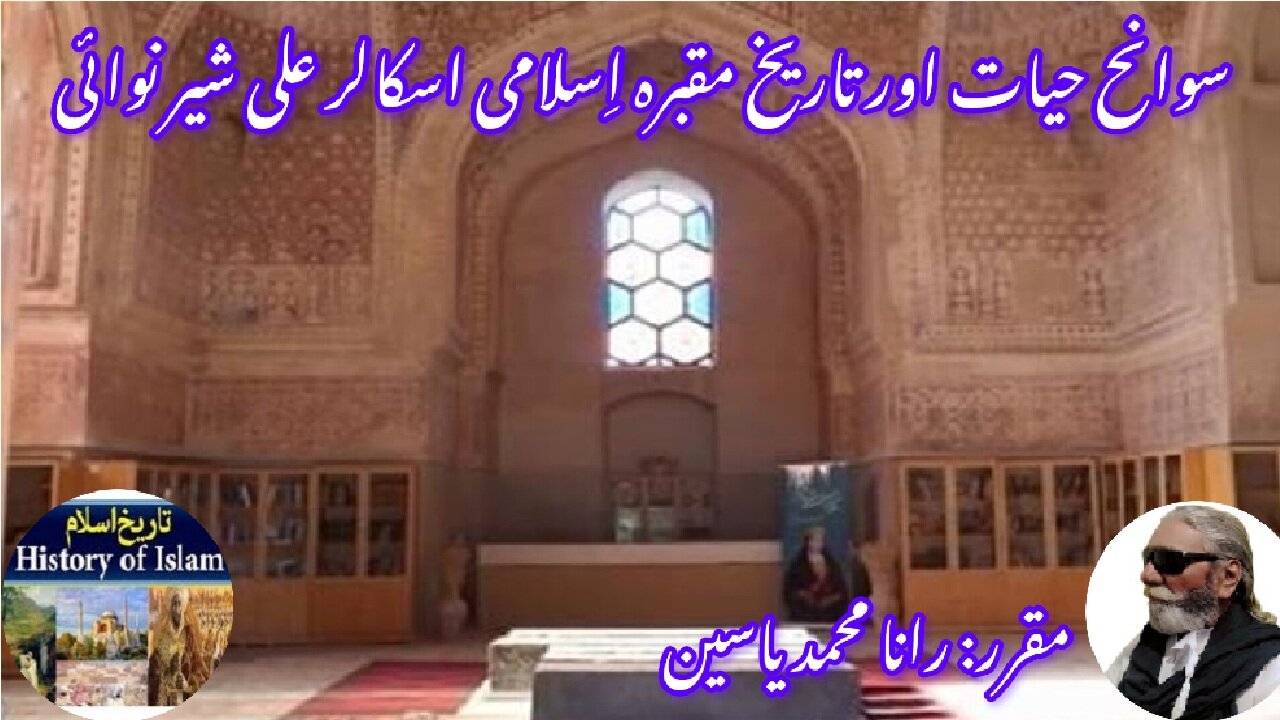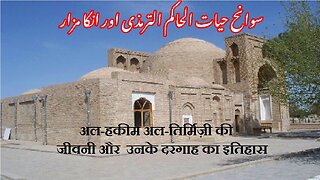Premium Only Content

Islamic Scholar Ali-Shir Navai |इस्लामी विद्वान अली-शिर नवाई | اسلامی اسکالر علی شیر نوائی
@islamichistory813 #IslamicHistory #NavaiShrine #HeritageSite
Bio Graphy of Islamic Scholar Ali-Shir Navai
Dekhti Aankhooon aur sountay kaanoon ko Asslamoalaikum, sisters, brothers friends and elders, In this Islamic scholars informative video, we are describing the biography of the renowned Islamic scholar Ali-Shir Navai. We will discuss the historical context of his life, his scholarly achievements, and the legacy he left behind. The video will also highlight the history of his shrine, and its geographical significance. This exploration aims to enrich your knowledge of a pivotal figure in Islamic history and the cultural landmarks associated with him.
Ali-Shir Navai also known as Nizam-al-Din Ali-Shir Herawi was a Timurid poet, writer, statesman, linguist, Hanafi Maturidi mystic and painter who was the greatest representative of Chagatai literature.
Nava'i believed that his native Chagatai Turkic language was superior to Persian for literary purposes, an uncommon view at the time and defended this belief in his work titled Muhakamat al-Lughatayn (The Comparison of the Two Languages). He emphasized his belief in the richness, precision and malleability of Turkic vocabulary as opposed to Persian.
Because of his distinguished Chagatai language poetry, Nava'i is considered by many throughout the Turkic-speaking world to be the founder of early Turkic literature. Many places and institutions in Central Asia are named after him, including the province and city of Navoiy in Uzbekistan.
Many monuments and busts in honour of Alisher Navoi's memory have been erected in different countries and cities such as Tashkent, Samarkand, Navoiy of Uzbekistan, Ankara of Turkiye, Seoul of South Korea, Tokyo of Japan, Shanghai of China, Osh of Kyrgyzstan, Astana of Kazakhstan, Dushanbe of Tajikistan, Herat of Afghanistan, Baku of Azerbaijan, Moscow of Russia, Minsk of Belarus and Washington D.C. of the USA.
Alisher Nava'i was born in 1441 at the city of Herat to a family of well-read Turkic chancery scribes. During Alisher's lifetime, Herat was ruled by the Timurid Empire and became one of the leading cultural and intellectual centres in the Muslim world. Alisher belonged to the Chaghatai mir class of the Timurid elite. Alisher's father, Ghiyath al-Din Kichkina ("The Little"), served as a high-ranking officer in Khorasan in the palace of the Timurid ruler Shah Rukh. His mother served as a prince's governess in the palace. Ghiyath al-Din Kichkina served as governor of Sabzawar at one time. He died while Alisher was young, and another ruler of Khorasan, Abul-Qasim Babur Mirza, adopted guardianship of the young man.
Alisher was a schoolmate of Sultan Husayn Bayqara, who would later become sultan of Khorasan. Alisher's family was forced to flee Herat in 1447 after the death of Shah Rukh created an unstable political situation. His family returned to Khorasan after order was restored in the 1450s. In 1456, Alisher and Bayqarah went to Mashhad with Abul-Qasim Babur Mirza. The following year Abul-Qasim died and Alisher and Bayqarah parted ways. While Bayqarah tried to establish political power, Alisher pursued his studies in Mashhad, Herat, and Samarkand.
After the death of Abu Said Mirza in 1469, Husayn Bayqarah seized power in Herat. Consequently, Alisher left Samarkand to join his service. In 1472, Alisher was appointed emir of the supreme counci , which eventually led him into a conflict with the powerful Persian bureaucrat Majd al-Din Muhammad Khvafi, due to the latter's centralising reforms, which posed a danger to the traditional privileges that the Turkic military elite (such as Alisher) enjoyed.[3] Alisher remained in the service of Bayqarah until his death on 3 January 1501. He was buried in Herat.
Alisher Nava'i led an ascetic lifestyle, "never marrying or having concubines or children
Nava'i is one of the most beloved poets among Central Asian Turkic peoples. He is generally regarded as the greatest representative of Chagatai language literature. His mastery of the Chagatai language was such that it became known as "the language of Nava'i".
Although all applications of modern Central Asian ethnonyms to people of Nava'i's time are anachronistic, Soviet and Uzbek sources regard Nava'i as an ethnic Uzbek. According to Muhammad ?aidar, who wrote the Tarikh-i-Rashidi, Ali-sher Nava'i was a descendant of Uighur Bakhshi scribes, which has led some sources to call Nava'i a descendant of Uyghurs. However, other scholars such as Kazuyuki Kubo disagree with this view.
Soviet and Uzbek sources hold that Nava'i significantly contributed to the development of the Uzbek language and consider him to be the founder of Uzbek literature. In the early 20th century, Soviet linguistic policy renamed the Chagatai language "Old Uzbek", which, according to Edward A. Allworth, "badly distorted the literary history of the region" and was used to give authors such as Alisher Nava'i an Uzbek identity.
In December 1941, the entire Soviet Union celebrated Nava'i's five-hundredth anniversary. In Nazi-blockaded Leningrad, Armenian orientalist Joseph Orbeli led a festival dedicated to Nava'i. Nikolai Lebedev, a young specialist in Eastern literature who suffered from acute dystrophy and could no longer walk, devoted his life's last moments to reading Nava'i's poem Seven Travelers.
Many places and institutions in Uzbekistan and other Central Asian countries are named after Alisher Nava'i. Navoiy Region, the city of Navoiy, the National Library of Uzbekistan named after Alisher Navoiy, the Alisher Navoi Opera and Ballet Theatre, Alisher Navoiy station of Tashkent Metro, and Navoiy International Airport – all are named after him.
Many of Nava'i's ghazals are performed in the Twelve Muqam, particularly in the introduction known as Muqäddimä. They also appear in popular Uzbek folk songs and in the works of many Uzbek singers, such as Sherali Jo‘rayev. Alisher Nava'i's works have also been staged as plays by Uzbek playwrights.
In 2021, an international spiritual event dedicated to the 580th anniversary of Ali-Shir Nava'i was held at the House of Friendship in Nur-Sultan, Kazakhstan.
Sisters brothers friends, and elders, now give us permission, up to tomorow, and tomorow we will described Biography of Islamic Scholar Abu al-Hassan al-Kharaqani. Allah Hafiz
===============================================
-
 8:37
8:37
ISLAMIC HISTORY
6 hours agoAl-Hakim al-Tirmidhi |अल-हकीम अल-तिर्मिधि | الحاکم الترمذی کی سوانح عمری اور ان کے مزار کی تاریخ
5 -
 LIVE
LIVE
BonginoReport
2 hours agoMusk’s 13th Alleged Baby Mama’s Anti-Privacy Tour - Nightly Scroll w/Hayley Caronia (Ep.17)
23,528 watching -
 LIVE
LIVE
Michael Franzese
1 hour agoLindy Li: DNC Insider Reveals Dark Truth About Biden, Kamala and Pelosi
1,120 watching -
 1:17:20
1:17:20
Kim Iversen
3 hours agoFrom Tesla-Smashing to Jasmine Crockett-Stanning: Woke Unhinged Edition
73.5K37 -
 1:34:17
1:34:17
Redacted News
3 hours agoNetanyahu Boasts Control Over Trump: Is Criticizing Israel About to Become Illegal?
75.4K106 -
 1:15:09
1:15:09
vivafrei
7 hours agoVirginia Giuffrie "Accident"? FBI Dragging Its Feet? Tesla Vandal Arrested & SUED! & MORE!
85.3K44 -
 56:01
56:01
Candace Show Podcast
3 hours agoBREAKING NEWS: I Got Served For ANOTHER Lawsuit | Candace Ep 169
59.8K81 -
 44:47
44:47
The Football Terrace
4 hours agoLewis-Skelly ABUSE is DISGUSTING!😨 Goldbridge CALLS OUT Ferdinand & Man City 115 VERDICT🚨
1.7K -
 17:03
17:03
VSOGunChannel
8 hours agoTaquito 22 Budget 22 Suppressor || Fletcher Rifle Works
2.06K1 -
 2:13:41
2:13:41
The Quartering
6 hours agoMillions Of Illegals Given Social Security Numbers, Wisconsin Supreme Court Race, Star Wars & More
199K71